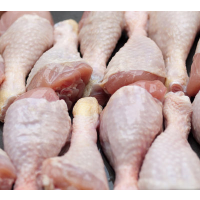Why Foster Farms Hasn’t Recalled Chickens after Salmonella Poisonings
 (photo: Libor Tomáštík)
(photo: Libor Tomáštík)
Although more than 340 people have been poisoned by salmonella after eating Foster Farms chickens from three California facilities, the company won’t be recalling its poultry from stores anytime soon and the government isn’t going to request they do.
The president of Foster Farms apologized last week for the outbreak that has landed more than 100 people in the hospital, and announced the company would address the problem by tidying up its facilities and pumping more antibiotics into its chickens. But federal law gives chicken producers a wide berth when it comes to declaring recalls.
The U.S. Department of Agriculture (USDA) announced two weeks ago that the tainted chicken, which had sickened people in 20 states, came from Foster Farms, but the law makes chicken recalls voluntary. Although the federal Centers for Disease Control and Prevention (CDC) says that 1 million people a year become ill nationally from salmonella and it is the Number 1 pathogen leading to hospitalization, the bacteria is legally regarded as a common contaminant that can be controlled by proper cooking.
That issue was resolved in the 1970s after the American Public Health Association (APHA) sued the USDA over contaminated meat. The USDA argued that it was unfair to single out the meat industry because bacteria, like salmonella, could also be found in eggs, chicken and other raw products, and cooking would eliminate the bacteria (and others like it, including e.coli).
The D.C. Circuit Court of Appeals agreed in its 1974 APHA v. Butz decision, which noted, “American housewives . . . normally are not ignorant or stupid and their methods of preparing and cooking of food do not ordinarily result in salmonellosis.”
The logic behind that decision was revisited 20 years later when an outbreak of e.coli in Jack-in-the-Box ground meat sickened more than 700 people. Most of the victims were children, and four of them died. Nearly 200 people suffered permanent debilitating illnesses, including kidney and brain damage.
Dead kids got the public’s attention and the USDA pronounced the strain of e.coli in the outbreak a dangerous adulterant that must be eliminated from meat. The industry fought back but lost and other strains of e.coli have since been included in required testing programs.
But salmonella is another story. So far, all that is required is an abject apology and more antibiotics, resulting in a growing number of bacteria that are resistant to them. The CDC identified seven strains of salmonella in the latest outbreak and five of them are resistant to antibiotics, a contributing factor in the high (40%) rate of hospitalization.
Although Foster Farms isn’t recalling the fowl, Kroger is pulling chickens with the USDA P6137, P6137A or P7632 marks of inspection and Costco is yanking the company’s rotisserie chicken out of its stores.
Contaminated food makes one out of every six Americans ill each year. More than 100,000 end up in a hospital and 3,000 die. Most just feel ill and wonder if they caught the flu, drank some tainted water or inhaled some noxious pollutants.
But there’s a decent chance it was just the food they ate.
–Ken Broder
To Learn More:
USDA: No Foster Farms Recall of Salmonella-Tainted Chicken for Regulatory Reasons (by Lynne Terry, The Oregonian)
Why the USDA Isn’t Recalling Salmonella-Contaminated Chicken That’s Sickening Hundreds (by Aviva Shen, ThinkProgress)
Foster Farms Apologizes for Salmonella Outbreak (by David Pierson and Tiffany Hsu, Los Angeles Times)
Salmonella, Ground Beef, and Silly "American Housewives" (updated w/ Recall Notice) (by Denis Diderot, Daily Kos)
BPI Ground Beef Salmonella Recall: Will the Meat Industry Sue, and Who Will the USDA Stand up for? (by Denis Stearns, Food Poison Journal)
Shutdown Slows Federal Response to Salmonella Outbreak that Started in California (by Ken Broder, AllGov California)
Contaminated Food Costs U.S. More Than $14 Billion a Year (by Noel Brinkerhoff and David Wallechinsky, AllGov)
- Top Stories
- Controversies
- Where is the Money Going?
- California and the Nation
- Appointments and Resignations
- Unusual News
- Latest News
- California Forbids U.S. Immigration Agents from Pretending to be Police
- California Lawmakers Urged to Strip “Self-Dealing” Tax Board of Its Duties
- Big Oil’s Grip on California
- Santa Cruz Police See Homeland Security Betrayal in Use of Gang Roundup as Cover for Immigration Raid
- Oil Companies Face Deadline to Stop Polluting California Groundwater





